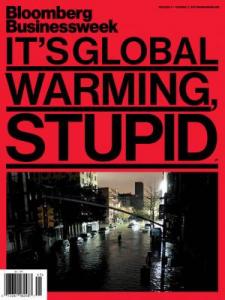THE BEGINNING OF THE BEGINNING OF THE END FOR THE US HEALTH CARE SYSTEM? It's not science, it's policy, but no question that the Steven Brill takeout on the disastrous US health care system in Time is going to shape the talk for some time to come and possibly even wreak some changes.
At great length, and employing the brilliant journalistic technique of simply walking us through hospital bills, the Brill piece took 26,000 words to make the case that the central problem is greed, oligopoly, greed, monopoly, and greed. It's full of juicy factlets like the one about the non-profit hospital with profits of 26%.
This is not news to the even modestly well-informed, but it will bring the word to the less so. Congress, perhaps. Tracker Paul Raeburn says it should win a National Magazine Award. I hope it will at least move the system closer to solutions. Herewith, a tiny sampling of the bloggery, with much more to come.
Aaron Carroll at The Incidental Economist notes that these things are only what he and others have been saying for years, and no, malpractice awards have nothing to do with it, but that otherwise the piece "was well written, extensively researched, and I think it will likely move a lot of people in a good direction!"
Uwe Reinhardt, the health policy experts' health policy expert, noted at Economix
Americans are shocked, just shocked. But what they should have known for years is that in most states, hospitals are free to squeeze uninsured middle- and upper-middle-class patients for every penny of savings or assets they and their families may have.
And, this is a stunner, simultaneously a panel discussion the American Enterprise Institute, that conservative bastion of unapologetic capitalism, concluded that the problem is hospital mergers that have led to oligopoly. A breathtaking event, described by Jay Hancock at the Kaiser Health News blog Capsules. Surely this has got to really be the beginning of the beginning of the end?
SELECTED WONKERY. Wonkblogger Sarah Kliff sums up the argument of the Brill piece in one sentence: The American health-care system does not use rate-setting. Paul Krugman thinks it's weird that Brill doesn't draw the obvious conclusion: We need a single-payer system. At the Health Care Blog, Martin Gaynor examines whether price controls are the answer. On the one hand, on the other hand. It may be fair and balanced, but the bottom line is he doesn't know. Or doesn't want to say?
Another Incidental Economist, Austin Frakt, notes that there are no "right" prices for health care in the absence of a competitive market. But of course there is no competitive market in the US, and the subtext of the debate is whether there ever can be one.
Meanwhile, in the real world, David Dobbs uses his daughter's foot injury to argue at Neuron Culture for a single-payer system.
THE GREENING OF THE NEW YORK TIMES. NOT. First to learn that the New York Times had abandoned its Green Blog late last Friday was Curtis Brainard, who covers science in the media. He squacked mightily about it at the Columbia Journalism Review's Observatory, calling the Times's declaration that reorganization of its environmental coverage meant no change in the paper's committment to the topic "an outright lie." And plenty more.
I have yet to find any commentary arguing that the change is harmless, let alone good. Below, a sampling. It was all dudgeon all the time, much of it nearly as high as Brainard's. Adding injury to injury, the Washington Post announced that it was moving reporter Juliet Eilperin off the climate change beat — where she has been a national star for a decade or more — to become part of its White House coverage.
Never one to understate his case, Joe Romm spoke for many when he called the moves "an epic blunder" at Climate Progress:
This weekend two of the premier newspapers in the country basically abandoned the story of the century — climate change — as a specialized beat.
At Collide-a-Scape, Keith Kloor says the actions are part of a more general "green fatigue," and wonders if they are related to the longtime suspicion of environmental writers, a belief that they are not real journalists at all, but just greens with press passes.
From Dot Earth, Andrew Revkin looked on, apparently more in sorrow than in anger, and concluded that the step was inevitable once the paper reorganized its environmental coverage in January. Why inevitable? He doesn't really say. Greg Hanscom points out at Grist that the blog had a unique function, serving as a central point of entry for environmental news and a place to house the bits and pieces that aren't quite a story but newsworthy nonetheless.
At the Yale Forum on Climate Change and the Media, Bud Ward concluded his mournful handwringing with this reasonable speculation: Even when eviscerated, Times environmental coverage may remain as good as there is.
Amid the scraps of its ever-declining in-print and online news hole for environmental and climate coverage, there remains a reality, however increasingly painful it may be: Times coverage of these issues is likely to remain among the best in a steadily diminished field of daily general-circulation and newsweekly competition. The best may not be as good as it traditionally has been, and may not even rise to the standard of “good” in many ways. But in a news industry increasingly bereft of daily journalistic excellence, one need no longer be great — or even good? — to be among the best.
Logically, it's hard not to agree, mostly, with John Fleck at Inkstain. The Times's stated justification is that nearly every beat has an environmental component, and it makes sense to situate environmental reporting within whatever "pod" it's related to. A debate about building dikes around New York City belongs on the City Desk and in political coverage of the mayor's office. The Keystone Pipeline belongs partly in coverage of the State Department, and maybe Commerce too, and in financial news, since a key factor is our trade relations with Canada.
But is that what the editors will actually do? Says Fleck:
it only works if Baquet and company aren’t bullshitting us here, if they’re really planning to drive the topic(s) out into the newsroom as a whole.
Knight Science Journalism Tracker Paul Raeburn pointed out an example of what can go wrong with this plan. Times columnist Joe Nocera made significant errors in his piece complaining about climate scientist James Hansen's political activism. Now maybe that example doesn't really count. We'd be appalled if a reporter made such mistakes because they would reveal how little he/she knew about the long history of the climate change debates. But we expect a lot less of columnists, who display their ignorance all the time, especially about technical matters (and history).
The Times's gutsy public editor, Margaret Sullivan, is not hopeful.
I’m not convinced that the Times’s environmental coverage will be as strong without the team and the blog. Something real has been lost on a topic of huge and growing importance … Especially given the Times’s declared interest in attracting international readers and younger readers, I hope that Times editors — very soon — will look for new ways to show readers that environmental news hasn’t been abandoned, but in fact is of utmost importance. So far, in 2013, they are not sending that message .
No question that dropping the Green Blog was a very odd decision. The Times publishes dozens of blogs; see the full list here. As many others have pointed out, 9 are on sports alone. Hard to imagine that Green was much of a strain on resources. The decision is so odd in fact that, taken together with reorganization of environmental coverage, it seems reasonable to wonder if something other than the stated reason lay behind it. Maybe Brainard was right when he said, “Readers deserve an explanation, but I can’t think of a single one that would justify this folly.” But give us the explanation and let's see.
HOW TO FIND ENVIRONMENT NEWS AT THE TIMES. There are three easy ways to get to environment news at the Times. But the methodology is not at all obvious, and none of the routes is by itself complete.
On the Home page, select Science from the left-hand menu. From the menu at the top of the Science page, select Environment. Presto. Tons of environment news, features, columns, opinion pieces, blogs, video, links, etc. Looking at this fully stuffed page, it's clear that there's lots and lots of coverage on the environment at the Times.
The page is not easy to find, and the URL doesn't even contain the word "environment;" instead, it seems to be "earth." Philosophically an interesting choice. Why don't they at least list this Environment page as one of the clicks on the Home page menu, like Science? Beats me. HT to Jonathan Beard for passing on this link.Enter Environment in the Search box. You won't get the Environment page aggregation. Instead the top item is Times Topics: Environment. This is a list of environment-related pieces and contains many items (from the Business section, for example) that are not on the Environment page.
The Business section has its own Energy and Environment page, also fully stocked.
So there's lots of stuff there, but if you want to be thorough, you really need to search the Times Topics heading and the two Environment pages.
SHIRT TALES: HEISENBERG WITHOUT PRINCIPLE. If you're near Baltimore March 20, stop by a reading of a play about the German physicists working on a "uranium bomb" for the Nazis — and why they failed to get there. The excuse they invented was that they deliberately dragged their feet so Hitler wouldn't get his bomb. This seizing of the moral high ground infuriated American physicists who had worked on the atomic bomb. Ann Finkbeiner tells all at Last Word on Nothing.


.png)

